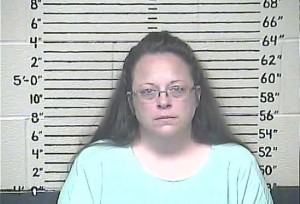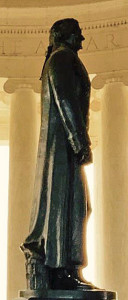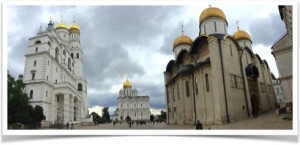 The Rowan County Clerk Kim Davis from Kentucky is not the first public official to defy a court order based on her intolerance, religious or otherwise, nor to claim the constitutionally impermissible defense that God told her to do it.
The Rowan County Clerk Kim Davis from Kentucky is not the first public official to defy a court order based on her intolerance, religious or otherwise, nor to claim the constitutionally impermissible defense that God told her to do it.
In 1963, Alabama Governor George Wallace refused to allow black students to join Alabama’s lily white school system, declaring Alabama to be the “great Anglo-Saxon Southland,” justifying segregation as a defense against forming a “mongrel unit” should the South integrate. Governor Wallace referred to the 14th Amendment as the “infamous illegal” 14th amendment, and said, of the Supreme Court’s decision in Brown, “[l]et those certain judges put that in their opium pipes of power and smoke it for what it is worth.” Wallace explained, as has Clerk Davis more recently, “[O]ur grandfathers bent their knee only in church and bowed their head only to God.”
A federal judge ordered Wallace to admit those black students to his lily white school system. Rather than be carried off by the National Guard and be put in jail, Wallace backed down for, as we have seen throughout history, demagogic bullies and their arrogant threats often dissipate like a cloud of pipe smoke when tested.
Around 2002, in Alabama again, Chief Judge Roy Stewart Moore created a 5,280 pound granite reproduction of the Ten Commandments he had installed in the central rotunda.
Moore told the federal court that the purpose of the monument was to recognize “the sovereignty of God over the affairs of men.”
U.S. District Judge Myron Thompson said that, since the purpose of the monument was to signify the authority of God over all citizens, the Judge’s purpose was to establish religion and the monument had to be removed.
Judge Moore told the Court that he would disobey the court’s order. The other judges of the state supreme court, however, overruled their colleague, Judge Moore, and directed that the monument be removed.
Chief Judge Moore himself was then removed by the Alabama Court of the Judiciary. The State’s Assistant Attorney General argued that a Judge that disobeys a court order, “undercuts the entire workings of the judicial system” and is telling the public, “[i]f you don’t like a court order, you don’t have to follow it.”
Clerk Davis elected to follow in these dishonorable footsteps when she defied a court order instructing her to perform the ministerial function of her Court Clerk’s office and issue lawful and secular marriage licenses to same sex couples.
Clerk Davis said she refused “on God’s authority,” a transparent concession that she was really seeking to violate the First Amendment’s prohibition against establishing religion, by supplanting the lawful execution of her office with her personal religious belief and disregarding the Supreme Court’s decision that same sex couples have a constitutional right to marry. Continue reading →



